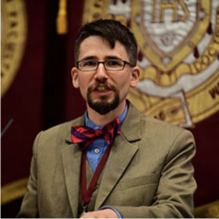Joshua Schrier
Kim B. and Stephen E. Bepler Chair in Chemistry
Fordham University
Department of Chemistry
Combining machine learning and automation to advance the discovery of new materials
Abstract
Machine learning and AI are rapidly transforming many areas of everyday life. How can we use them to improve chemistry and materials research? Data is a perquisite, but experimental data presents unique challenges—it is often limited in scale, biased by human choices, and often only semi-structured, all of which present challenges for classic machine learning approaches. Automated experimentation provides the opportunity to improve the quality and scale of experimental data, and also creates opportunities to let algorithms guide the performance of new experiments.
In this talk, I will describe our efforts in developing RAPID (Robotic-Accelerated Perovskite Investigation and Discovery)—a platform for doing semi-automated syntheses of metal halide perovskites—and ESCALATE (Experiment Specification, Capture and Laboratory Automation Technology) an adaptable open-source package for experiment description and data collection. I will discuss several example applications where we have been able to use this hardware and software combination to accelerate the discovery of new materials, find scientific insights latent in our historical datasets, perform model-driven quality control on our scientific experiments, automate “serendipity” by statistical analysis of experimental metadata, and benchmark experiment planning algorithms in the laboratory.
Finally, I will discuss limitations of existing machine learning and AI methods for the discovery of “exceptional” materials—those with unusual combinations of properties and compositions often needed in technological applications—which are by their nature outside of the training data distribution. After briefly summarizing case studies of the limits of existing machine learning approaches for the discovery of high-Tc superconductors and superhard structural materials, I will describe six research directions which can address these limitations.
Bio
Joshua Schrier is a physical chemist interested in using computers to accelerate the discovery of new materials, by using a combination of physics-based simulations, cheminformatics, machine learning, and automated experimentation. He is the Kim B. and Stephen E. Bepler Professor of Chemistry at Fordham University in New York City. Prior to joining Fordham in 2018, he was on the faculty at Haverford College, and a Luis W. Alvarez computational sciences postdoctoral fellow at Lawrence Berkeley National Laboratory. As a faculty member, he has received awards include the Dreyfus Teacher-Scholar, U.S. Department of Energy Visiting Faculty, and Fulbright scholar awards.
Wednesday, September 20, 2023

Joshua Schrier
Kim B. and Stephen E. Bepler Chair in Chemistry
Department of Chemistry
Fordham University
- Time: 11:00 AM
- Location: 206 Furnas Hall